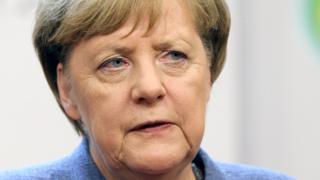Germany coalition: Merkel and SPD to meet in new bid for deal
German Chancellor Angela Merkel and her ex-coalition partners Social Democrats are to hold discussions in efforts to end a political impasse.
The centre-left SPD has softened its stance, saying it is open for talks.
Leader Martin Schulz had refused to renew a coalition with Mrs Merkel's conservatives but came under pressure from allies to change his position.
Mrs Merkel failed to form a coalition government with the liberal Free Democrats and the Greens this week.
German President Frank Walter Steinmeier will host Mr Schulz and Mrs Merkel for talks next week.
What is Schulz's position?
He had strongly rejected joining a "grand coalition" led by Mrs Merkel's Christian Democrats (CDU) and the Christian Social Union (CSU) and promised to take his party into opposition.
But in a slight shift on Friday, he did not categorically rule out a new alliance, saying that "nothing [was] automatic" on the party's direction.
"But one thing is very clear: if a discussion results in us deciding to participate in any form whatsoever in the formation of a government, we will put it to a vote of party members."
- The slipping crown of Angela Merkel
- What are the options?
On Thursday, Mr Schulz met President Steinmeier, who is trying to break the stalemate by talking to party leaders. He then had eight hours of late-night talks with SPD leaders.
The SPD governed in coalition with Mrs Merkel between 2013 and 2017. But Mr Schulz promised to change course after September's election, when his party had its worst result since 1949.
What could happen?
- The SPD could join Mrs Merkel in a coalition but also in an agreement to not obstruct a minority government led by the chancellor
- Mrs Merkel could form a minority government with the Greens – the FDP pulled out of talks. But the chancellor previously said she preferred new elections to an unstable minority government
- President Steinmeier could call for a new election, after a long drawn-out process that would take months. Polls suggest a new vote would produce a result similar to September's election. There is also the fear that the far-right Alternative for Germany (AfD) could benefit the most
In the meantime, who is governing?
Mrs Merkel's ministers remain in office in a caretaker role, as the September election produced no overall majority.
Until a government is agreed, she continues as acting chancellor, while the newly-elected German parliament sits as normal.
The delay in forming a new coalition – the biggest crisis of Mrs Merke's political career – has worried some European Union allies, who see Germany as a pillar of stability in the bloc.
Speaking in Brussels, Mrs Merkel said Germany continued to have a government committed to the EU.
"We are conducting the consultations we need with our parliament in order to be capable of taking the necessary decisions."

